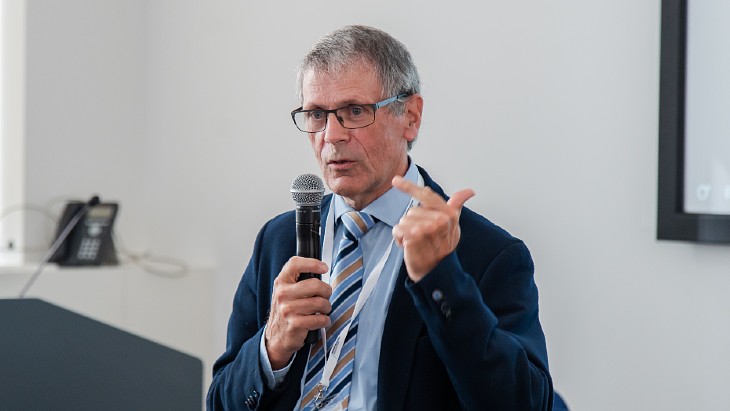The expert
Marcel Lips is a chemical engineer with a PhD in technical science from the Swiss Federal Institute of Technology. He is currently deputy plant manager at the Gösgen nuclear power plant in Switzerland, where he has worked for 33 years, including two decades as director of chemistry and radiation protection. He is also vice-president of Zwilag, a Swiss waste treatment and intermediate storage facility. Since 2005, Marcel has been a member of World Nuclear Association's Radiological Protection Working Group (RPWG), including more than 10 years as chairman, and has also been a member of the Decommissioning Working Group. Ahead of his retirement next year, the association presented an award to him at the Members Forum meeting in September, recognising his outstanding service to the nuclear industry.
Marcel, in simple words, what is the role of the RPWG?
We represent industry's point of view on radiation protection, promote leading practice, share knowledge and ideas and assure that industry expertise and perspectives are considered in the setting of radiological protection standards with global implications for nuclear commerce and operations. Our work is necessary because the voice of industry delivers practical input for those who set the standards, guidelines, rules and regulations in the field of radiological protection. For example, the International Commission on Radiological Protection (ICRP) has initiated a process for the review of the system of radiological protection, which is likely to lead to a new set of General Recommendations. This process will shape radiation-related policy, practice, guidelines, and regulations around the world in the decades to come. We as an industry need to get involved in this process.
Why it is important for the nuclear industry and World Nuclear Association member companies to get involved in the ICRP?
The outcome of this process could have an enormous impact for the nuclear industry and other nuclear technology sectors. That's why it is appropriate to ensure due consideration is given to practicality and proportionality in relation to any changes in the system for radiological protection and to ensure that industry expertise and perspectives are considered in the setting of radiological protection standards with global implications for nuclear commerce and operations. Member companies should be aware that the impact of current RPWG activities, in particular their inputs and feedback regarding ICRP review process, will only be visible in about 20 years from now. We should encourage our member companies to actively participate in these very important RPWG activities even if the results are two decades ahead of us.
What is the best way to get involved in ICRP review process?
The backbreaking work within the ICRP review process takes place in ICRP task groups. At present, 31 of them are active. Currently less than 1% of the members of the ICRP's task groups and committees are drawn from nuclear industry. If we, as an industry, want to make a difference and/or significantly influence the process to have practical, proportionate and simple radiological protection legislation, then we need to change that picture. Member companies should encourage and allow their radiological protection experts to apply for ICRP or task group membership.
As part of the ICRP review process, World Nuclear Association's RPWG hosted and organised, in collaboration with ICRP, a workshop on 27-28 September in Bristol. The workshop provided an excellent opportunity to promote wider understanding of optimisation of risk, based on the all-hazards approach and effective communication of the system of radiological protection. We had sessions on good practices in effective communication of the radiological protection system and practical examples in applying the optimisation process based on an all-hazards approach. Presentations were provided from different nuclear industry sectors starting from uranium mining, naturally-occurring radioactive materials (NORM), new build, small modular reactors (SMRs), operating nuclear power plants, research, decommissioning and geological disposal. Views from ICRP itself and from regulatory bodies were also part of the workshop.
I think the workshop was really successful. ICRP recognised that radiation is not always a primary hazard and will endeavour to recognise that radiation is one of a number of hazards and risks. ICRP agreed to explore opportunities to reduce complexity to ensure that its system was practical and implementable. World Nuclear Association has offered to provide member support for any work groups. At this point I would like to thank all World Nuclear Association staff and RPWG members involved. Thanks to their support, the workshop was so successful.
As the chair of RPWG, what are the benefits you received by joining the working group?
I see the nuclear industry as an important pillar of climate-neutral energy supply, which is why I am happy to get involved in the preservation and expansion of this technology on a global scale. Except for a few countries, the benefits of nuclear energy are fully recognised. It goes without saying that the commitment is associated with effort. On the other hand, thanks to my involvement in World Nuclear Association, I was able to make many contacts and get to know interesting people all over the world. Although working with our stakeholders is challenging and not always easy, it also provides knowledge that can be used beneficially in daily work. It provides indications of the direction in which developments are going. In this way, members' own programmes and activities can be set up appropriately and with foresight.
What is your message to encourage new members and young professionals to join RPWG?
Our working group is always looking for new members to join, notably younger professionals. Current members work across the industry including at uranium mines, nuclear power plants, and at research institutes. Regular participation in RPWG provides an important support network and can help with professional accreditation. You will moreover be contributing to work that influences the future of our industry.






_18570.jpg)
_16159.jpg)
_49205.jpg)



